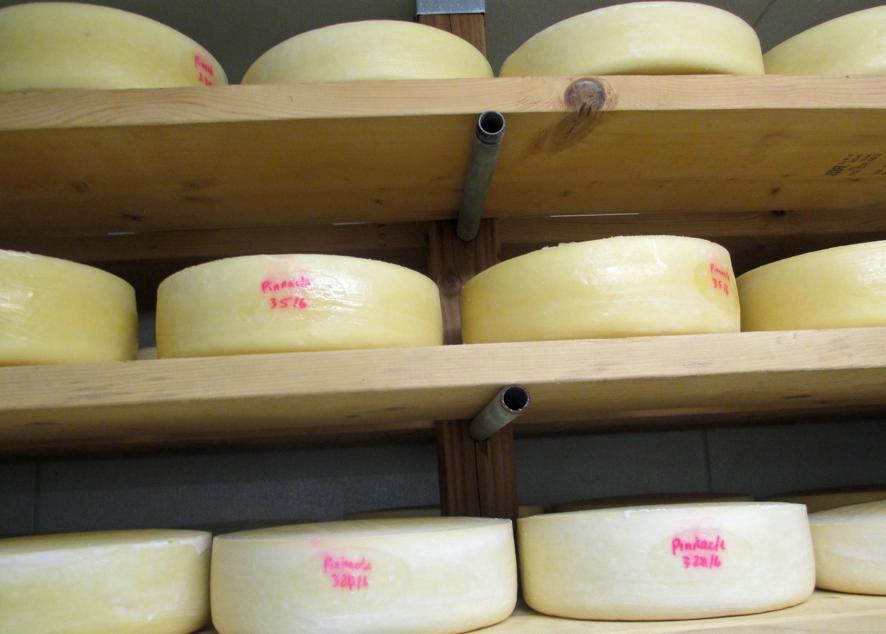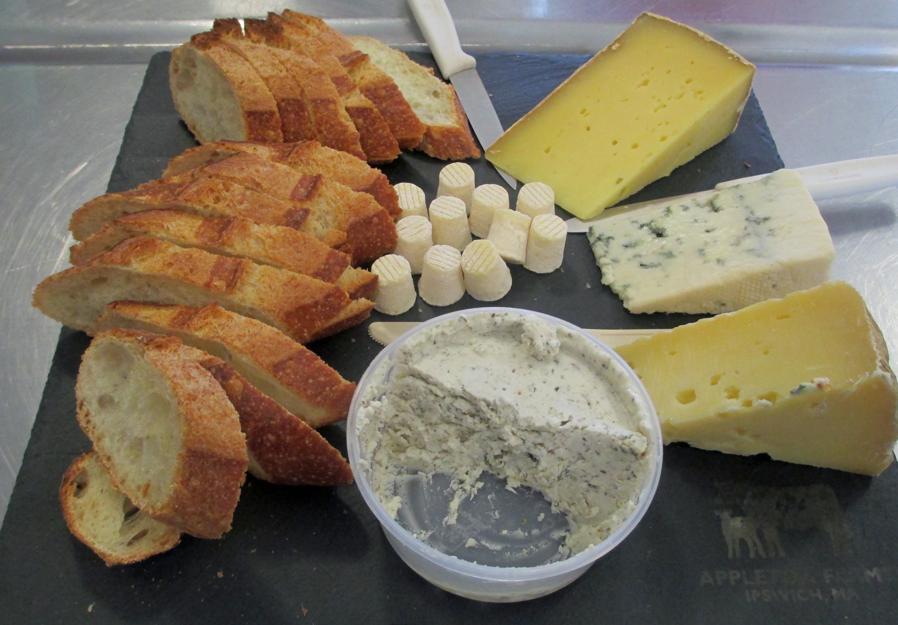HAMILTON AND IPSWICH — You’ve heard of farm-to-table. At Appleton Farms, it’s cows-to-cheese.
The Jersey cows responsible for making the milk stood just a few yards away from the farm kitchen where we were making mozzarella. At least we were trying to make mozzarella. Our cheese-like ball was supposed to be shiny and resemble a golf ball, but it looked more like a blob of brain matter or overcooked cauliflower. “Do you need hot water?’’ asked our instructor, Appleton Farms’ cheesemaker, Kristian Holbrook. “We need wine,’’ said Bob, our cheese buddy, who was trying mightily to transform his lumpy substance, submerged in hot water, into something that resembled mozzarella.
Alas, there was no wine — that would come later at home, when we sampled the cheese we made at Appleton Farms’ first-ever cheese fundamentals workshop, part of the Appleton Cooks! series.
Eleven of us had gathered at Appleton Farms, one of the oldest continuously operating farms in the country, to discover the mysteries of cheese making, trying our hand at making mozzarella and ricotta. The 1,000-acre farm, with acreage in Hamilton and Ipswich, was established by the Appleton family in 1636 and has been operated by the Trustees of Reservations since 1998 as a “working landscape,’’ with a herd of 40 dairy cows and 80 White Park beef cattle. The Trustees operate a CSA on the property, along with a dairy store that’s open to the public, where they sell fresh milk, eggs, and four types of cheeses made by Kristian Holbrook.
“It’s a bit of work, but it’s a magical process when you see what’s out there in the fields and then see what happens in the kitchen,’’ Holbrook said, as we tromped around the milking facility to greet the cows. When the grass is ready, the cows will go out to pasture on this grass-fed farm, and only come in for milking. We liked the fact that our cheese-making class was also a behind-the-scenes tour of Appleton Farms, a place we’d visited previously to hike and snowshoe on the trails. Meeting the animals was fun, especially since some of the calves and goats were spring babies. Those who love all of this can volunteer at the farm. “We’re always looking for helping hands,’’ says Appleton Farms’ engagement manager Beth Zschau. Ages 13 to 15 are welcome to volunteer with a parent, while those 15 and up can volunteer to work on their own.
After oohing and ahhing at the little critters, we made a quick visit to Appleton Farm’s commercial cheese room, where Holbrook described the process. Rounds of Pinnacle cheese filled two cheese caves; the cheese spends four days in brine and then ages in a temperature- and humidity-controlled cheese cave for three months. We popped inside a cheese cave, and whoa, was it stinky. “When cheese ages, it gives off an ammonia smell,’’ Holbrook explained. If you stay in there long enough, your eyes water.
When the cheese-maker started talking about mites in the cheese, another part of the process, we stopped paying attention. There’s such a thing as too much information when it comes to cheese.
Nonetheless, our classmates were snapping photos of the cheeses lined up in the caves. In spite of the smell, there was plenty of cheese-love going on. “Cheese is one of my favorite food groups, along with chocolate and wine,’’ Jessica from Beverly noted.
“In the 12 years since I’ve been making cheese, there’s definitely been more interest in cheese and cheese making,’’ says Holbrook, who came to Appleton Farms in December from a farm in Pennsylvania. He worked as a chef in fine-dining restaurants, a stressful job, and “making cheese calmed me down,’’ he says.
“Cheese is basically just milk, rennet, and salt,’’ Holbrook said, when we were back in the kitchen. Rennet, an enzyme found in a calf’s stomach, solidifies the milk, Holbrook explained. (There’s also plant-based rennet, including one made from thistle.) Rennet, in tablet or liquid form, is available online. Mozzarella making requires chlorine-free water, non-pasteurized or raw milk (not the supermarket kind, which is ultra-pasteurized), and citric acid. Cheese making kits are available from Massachusetts-based www.cheesemaking.com, where you can find recipes and tips.
As the group looked on, Holbrook was at the stove, separating the custard-y curd from the watery whey. Finally, we each got a chunk of the mixture, submerged in hot water (heating strengthens the curds). This, we folded onto itself about 10 times, with the goal of nice, shiny cheese balls. Ultimately, while our mozzarella didn’t reach silky perfection, we declared it “good enough’’ and sprinkled some salt on our ultra-fresh cheese.
Happily, our ricotta making went more smoothly.
“Hmm, what to do with this — tiramisu, a cannoli, or a mini-lasagna?’’ said Betsy of Manchester-by-the-Sea, one of our classmates, as we contemplated our take-home portion.
At this point, Holbrook declared we were ready to move on to making other cheeses, like a brie. After all, “It’s all really the same process,’’ he said.
Our cheese-making days might be behind us, but we definitely have a new appreciation for the effort it takes to make it.
APPLETON FARMS offers cooking classes, programs for kids, and farm dinners. Upcoming cheese-making tours will take place on June 5, 12, and 26. Appleton Farms cheeses (and other Massachusetts-made artisan cheeses) are available for purchase at the Appleton Farms booth at Boston Public Market. The Trustees’ kitchen at Boston Public Market hosts “cheese chats’’ with a cheese monger on the last Friday of every month. On May 7, they’ll offer a pairing beer and cheese’’ event. For upcoming events and information, visit www.thetrustees.org.
Diane Bair and Pamela Wright can be reached at bairwright@gmail.com.





